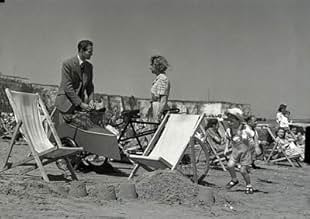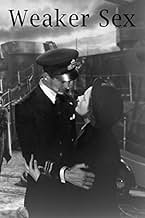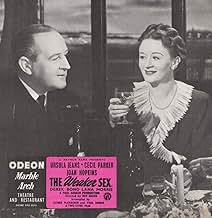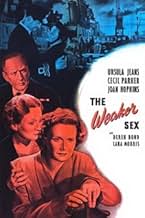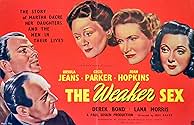Ajouter une intrigue dans votre langueA mother struggles to maintain normalcy at home as D-Day nears. With lodgers, absent children in the Navy, and no war job, she questions her choice to remain a housewife when her son's ship ... Tout lireA mother struggles to maintain normalcy at home as D-Day nears. With lodgers, absent children in the Navy, and no war job, she questions her choice to remain a housewife when her son's ship is damaged.A mother struggles to maintain normalcy at home as D-Day nears. With lodgers, absent children in the Navy, and no war job, she questions her choice to remain a housewife when her son's ship is damaged.
- Réalisation
- Scénario
- Casting principal
- Récompenses
- 2 victoires au total
Basil Appleby
- Seaman Taylor
- (non crédité)
Clement Attlee
- Self
- (images d'archives)
- (non crédité)
Dorothy Bramhall
- Mrs. Maling
- (non crédité)
Winston Churchill
- Self
- (images d'archives)
- (non crédité)
Helen Goss
- Woman in Silk Stockings Queue
- (non crédité)
Avis à la une
A rather inconsequential drama that offers a post-war pat on the back to all the housewives that kept the home fires burning while their menfolk and daughters were off fighting Nazis. Ursula Jeans is the anchor of both the film and the family that faces the typical highs and lows of domestic wartime life. It's watchable enough, but feels awfully rushed and episodic the longer it goes on, and is probably the only film in which Cecil Parker plays the romantic lead...
This small scale English movie was beautifully crafted by talented hands behind & before the camera. Notably, cinematographer Erwin Hillier, (whose b & w night scenes were beautifully composed and lit here), and a familiar and likable cast headed by Ursula Jeans and Cecil Parker added to this ironically titled film. Set around the central event of D-Day preparations and the aftermath of all the concentrated activity on the war, it demonstrated the emotional ripples on such events throughout the lives of the characters, centering on the household of Jeans, her children, and the military service personnel who come in and out of their lives as boarders during the war.
While some might dismiss this as a trite movie about inconsequential people in a great turning point in history, the strength of this film is that detailed, largely domestic focus on the wartime anxieties, hard work and, of course, usually stoic British attitudes toward the war. This was heightened by the skilled filmmakers' ability to show the emotional ebbs and tides surging beneath the seemingly placid surface of the characters' lives. One illustration of this was the work of character lead Cecil Parker as a middle aged naval officer and widow Ursula Jeans as they quietly realized that their platonic friendship was deeper than either had fully realized.
While some might dismiss this as a trite movie about inconsequential people in a great turning point in history, the strength of this film is that detailed, largely domestic focus on the wartime anxieties, hard work and, of course, usually stoic British attitudes toward the war. This was heightened by the skilled filmmakers' ability to show the emotional ebbs and tides surging beneath the seemingly placid surface of the characters' lives. One illustration of this was the work of character lead Cecil Parker as a middle aged naval officer and widow Ursula Jeans as they quietly realized that their platonic friendship was deeper than either had fully realized.
This movie could easily have been an unmitigated disaster -- no plot to speak of, not much in the way of memorable dialog, the uneasy feeling a viewer has nowadays that it's all a great big stiff-upper-lip and tally-ho-for-rationing exercise. What saves it is the transcendent acting -- lines spoken so perfectly, body movements so in sync with the spirit of the situations -- and a sure sense of editing that keeps the story (slim pickins as it is) moving. So what have we here, after all's said and done? I think we've been given a good postcard for future generations, a card which says, "Yes, this is how it was; this is how we got through it all. We behaved well toward one another, and we all came out of it all right." I often stop movies to take breaks if they seem a little long-ish. This one played right through to the end, and I was sorry to see it finish. I could have spent much more time with these lovely people.
The cast and crew were some of the best British movies had to offer. This moving tale of what it was like in England in and just after the war years. I really enjoyed Thora Herd as the ever reliable Char lady, chatting all the time with nothing to say she was perfect. Cecil Parker who was head over heels in love with delightful Ursula Jeans but did not have the nerve to tell her till 2/3rds through the film, very English. The trivia was exactly right. A real who's who in the British film industry. Roy Baker directing, Vetchinsky art direction and Hillier a master of black and white photography. Miur Mathieson, music Seeing this 1948 movie for the 1st time in 2004, I was prepared to be disappointed but was not.
This is rather a strange film with an even stranger title.The film has a substantial amount of newsreel film intercut with the drama.Also there are newspaper headlines shown often when they seem to be of little dramatic point.Cecil Parker and Thora Bird steal the acting honours.I do wonder what contemporary audiences would have made of this film.Particularly being reminded of the austerity that everyone was having to suffer.Films like this were far better made during the war.
Le saviez-vous
- AnecdotesMartha Dacre quotes from "Life a duty" by Ellen Sturgis Hooper (February 17, 1812 - November 3, 1848): "I slept, and dreamed that life was Beauty; / I woke, and found that life was Duty."
- Crédits fousOpening credits prologue: The story of Martha Dacre and her family covered the period of four years from D-Day onwards . . .
It might have been your story.
- ConnexionsReferenced in The Good Life: The Weaker Sex? (1975)
- Bandes originalesThese Foolish Things (Remind Me of You)
(uncredited)
Written (1936) by Eric Maschwitz and Jack Strachey
Sung by Cecil Parker in opening scene
Meilleurs choix
Connectez-vous pour évaluer et suivre la liste de favoris afin de recevoir des recommandations personnalisées
Détails
- Durée1 heure 24 minutes
- Couleur
- Rapport de forme
- 1.37 : 1
Contribuer à cette page
Suggérer une modification ou ajouter du contenu manquant

Lacune principale
By what name was The Weaker Sex (1948) officially released in India in English?
Répondre
